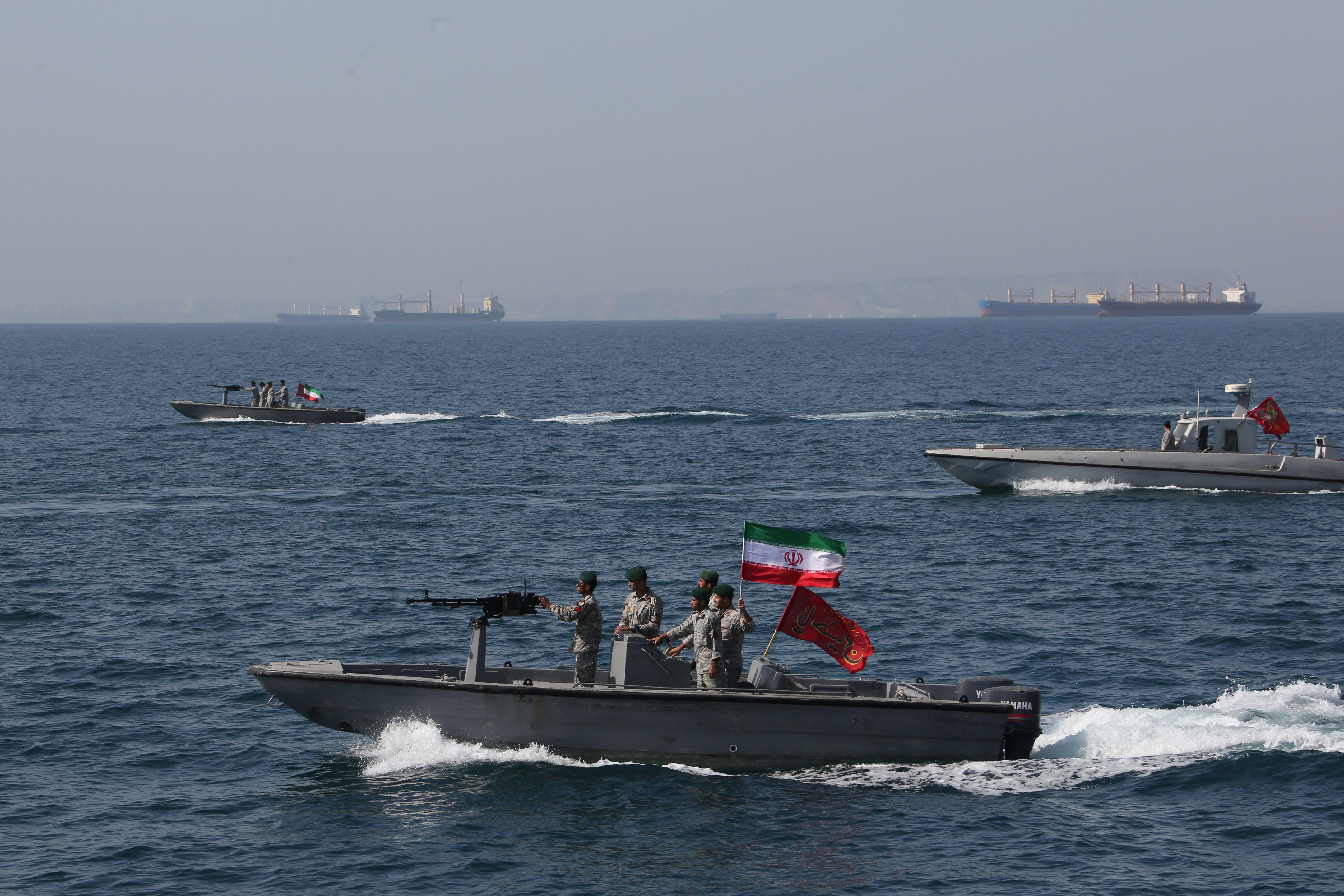Are US-Iran tensions flaring again?
Trump threatens military action over Twitter

A free daily email with the biggest news stories of the day – and the best features from TheWeek.com
You are now subscribed
Your newsletter sign-up was successful
The US and Iranian governments are at odds again after Donald Trump threatened military action against the Middle Eastern state.
The US president posted the warning to the Iranian navy on Twitter on Wednesday, saying: “I have instructed the United States Navy to shoot down and destroy any and all Iranian gunboats if they harass our ships at sea.”
The president seemed to be reacting to a confrontation on 15 April, when the US military said numerous small craft from the Islamic Revolutionary Guard Corps (IRGC) sped within yards of US warships in the Persian Gulf in a series of “dangerous and harassing approaches”.
The Week
Escape your echo chamber. Get the facts behind the news, plus analysis from multiple perspectives.

Sign up for The Week's Free Newsletters
From our morning news briefing to a weekly Good News Newsletter, get the best of The Week delivered directly to your inbox.
From our morning news briefing to a weekly Good News Newsletter, get the best of The Week delivered directly to your inbox.
“We don’t want their gunboats surrounding our boats, and travelling around our boats and having a good time,” Trump told reporters. “We’re not going to stand for it… They’ll shoot them out of the water,” reports Sky News.
Trump’s declaration changes the rules of engagement for US vessels, which normally have to be under direct threat to use lethal force.
Why now?
CNN has a theory as to why the president’s threat came when it did. “Roughly a half hour before Trump tweeted Wednesday, Fox & Friends, which Trump regularly watches, aired a segment about the incident, as well as a report on Iran launching its first military satellite into orbit,” it said.
A free daily email with the biggest news stories of the day – and the best features from TheWeek.com
While the hostilities between the two countries far predates the Covid-19 pandemic, The New York Times speculates that the current rise in tensions may not be totally disconnected.
“At home, the Iranian government and Mr. Trump’s administration have been criticised for mismanaging the response to the virus, and leaders in both nations may calculate that there is an advantage to reigniting confrontations with old adversaries,” the newspaper says.
As the oil industry relies so heavily on tankers passing freely from oil-producing gulf nations through the Strait of Hormuz, and out into the open ocean, any chance of disruption in the region raises the price of oil reliably.
With the oil industry reeling from the freefall in prices caused by the now-ended oil war, and more significantly by the demand-vaporising coronavirus pandemic, prices suddenly rebounded on Wednesday following Trump’s tweet.
What has the reaction been?
Iran responded with its own threat, saying they are prepared to destroy American warships if their security is threatened in the Persian Gulf.
The head of the IRGC, Hossein Salami, said: “I have ordered our naval forces to destroy any American terrorist force in the Persian Gulf that threatens security of Iran’s military or non-military ships. Security of the Persian Gulf is part of Iran’s strategic priorities.
“I am telling the Americans that we are absolutely determined and serious in defending our national security, our water borders, our shipping safety, and our security forces, and we will respond decisively to any sabotage. Americans have experienced our power in the past and must learn from it.”
Despite Iran’s threats, Trump’s allies have supported his message. The vice-chairman of the US Joint Chiefs of Staff, General John Hyten, said Trump’s tweet was a useful warning to Iran.
He said Iranian naval activity last week “goes right along with the harassment from the fastboats,” he said. “You put those two things together and it’s just more examples of Iranian malign behaviour and misbehaviour,” ITV News reports.
“The president issued an important warning to the Iranians,” David Norquist, the deputy secretary of defence, said at a Pentagon news conference when asked about the tweet.
“What he was emphasising is, all of our ships retain the right of self-defence.”
But General Abolfazl Shekarchi, a spokesperson for Iran’s armed forces, accused Trump of “bullying” and said he should focus on the US coronavirus problem, says Sky News.
Why are the two countries so hostile to each other?
Trump’s strident announcement was consistent with his administration’s “maximum pressure” Iran approach. He has talked openly about restoring deterrence against the Middle Eastern nation, and considers the previous administration’s purportedly lenient approach to have allowed Tehran to become too assertive.
It was in this vein that the US killed Iranian major general Qasem Soleimani early this year.
Specifically, as a presidential candidate in 2016, Trump said at a rally that when Iranians “circle our beautiful destroyers with their little boats… they will be shot out of the water”.
“Mr Trump has frequently said any US retaliation to serious Iranian actions would be swift and significant,” reports the Financial Times. “But US defence officials are concerned that Iran is prepared to bear losses from any US military response if it helped Tehran achieve its strategic goal of forcing the US from the region.”
-
 Local elections 2026: where are they and who is expected to win?
Local elections 2026: where are they and who is expected to win?The Explainer Labour is braced for heavy losses and U-turn on postponing some council elections hasn’t helped the party’s prospects
-
 6 of the world’s most accessible destinations
6 of the world’s most accessible destinationsThe Week Recommends Experience all of Berlin, Singapore and Sydney
-
 How the FCC’s ‘equal time’ rule works
How the FCC’s ‘equal time’ rule worksIn the Spotlight The law is at the heart of the Colbert-CBS conflict
-
 Currencies: Why Trump wants a weak dollar
Currencies: Why Trump wants a weak dollarFeature The dollar has fallen 12% since Trump took office
-
 TikTok: New owners, same risks
TikTok: New owners, same risksFeature What are Larry Ellison’s plans for TikTok US?
-
 Trump wants a weaker dollar, but economists aren’t so sure
Trump wants a weaker dollar, but economists aren’t so sureTalking Points A weaker dollar can make imports more expensive but also boost gold
-
 Leadership: A conspicuous silence from CEOs
Leadership: A conspicuous silence from CEOsFeature CEOs were more vocal during Trump’s first term
-
 The end for central bank independence?
The end for central bank independence?The Explainer Trump’s war on the US Federal Reserve comes at a moment of global weakening in central bank authority
-
 Can Trump make single-family homes affordable by banning big investors?
Can Trump make single-family homes affordable by banning big investors?Talking Points Wall Street takes the blame
-
 Phish food for thought: Ben & Jerry’s political turmoil
Phish food for thought: Ben & Jerry’s political turmoilIn the Spotlight War of words over brand activism threatens to ‘overshadow’ the big ice cream deal
-
 What a rising gold price says about the global economy
What a rising gold price says about the global economyThe Explainer Institutions, central banks and speculators drive record surge amid ‘loss of trust’ in bond markets and US dollar